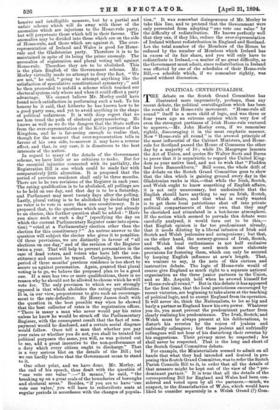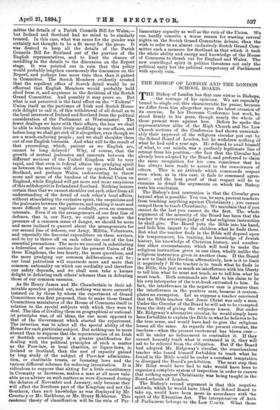POLITICAL CENTRIFUGA_LISM. T HE debate on the Scotch Grand Committee has
illustrated more impressively, perhaps, than any recent debate, the political centrifugalism which has been the result of the Home-rule movement. "Home-rule all round" itself is a mere child of logic, and was three or four years ago an extreme opinion which very few of even the strongest partisans of Irish Home-rule ventured to approve,—Mr. John Morley even, if we remember rightly, discouraging it in the most emphatic manner. Now "Home-rule all round" is the avowed principle of the most influential of the Cabinet Ministers, and Home- rule for Scotland passed the House of Commons the other day by a majority of 10; while Dr. Macgregor laments the Act of Union, and quotes Sir Walter Scott and Burns to prove that it is unpatriotic to regard the United King- dom as your native land, and not to wish that "Flodden had been Bannockburn." Still worse, the whole drift of the debate on the Scotch Grand Committee goes to show that the idea which is gaining ground every day in the Gladstonian ranks is this,—that while the Irish, Scotch, and Welsh ought to know something of English affairs, it is not only unnecessary, but undesirable that the English should have anything to say on Irish, Scotch, and Welsh affairs, and that what is really wanted is to get these local patriotisms shut off into private political compartments of their own that they may" be cherished and stimulated in a hot-house atmosphere. If the notion which seemed to pervade this debate were carefully analysed, it would turn out to be this,— that English opinion is far too predominant already, that it needs diluting by a liberal infusion of Irish and Scotch and Welsh jealousies and antagonisms ; but that, on the other hand, the nursery-ground of Irish, Scotch, and Welsh local enthusiasms is not half exclusive enough, and that they need much more elaborate provisions for fostering them, which can only be secured by keeping English influence at arm's length. That, we venture to say, is the note of this curious and instructive debate. The logic of Home-rule would of course give England as much right to a separate national organisation as the three junior partners in the Union, and so Mr. Asquith held when he avowed himself for "Home-rule all round." But in this debate it has appeared for the first time, that the local patriotisms encouraged by recent victories, are beginning to take alarm at the teaching of political logic, and to except England from its operation. It will never do, think the Nationalists, to let so big and burly a partner as England know his own power. Whatever you do, you must prevent the predominant partner from clearly realising his predominance. The Irish, Scotch; and. Welsh must be always present at his deliberations, to disturb his reveries by the voices of jealous and unfriendly colleagues ; but these jealous and unfriendly colleagues will not hear of his disturbing their reveries by his suggestions. Their privacy must be respected ; his shall never be respected. That is the long and short of the Scotch Grand Committee debate.
For example, the Ministerialists seemed to admit on all hands that what they had intended and desired in pro- posing this Scotch Grand Committee, was to refer the Scotch Parish Councils. Bill to it, in order that all the details of that measure might be kept out of the view of the "pre- dominant partner." It is true that all the details of the corresponding Bill for England and Wales had been con- sidered and voted upon by all the partners,—much, we suspect, to the dissatisfaction of Wiles, which would have liked to consider separately in a Welsh Grand (?) Coin- mittee the details of a Parish Councils Bill for Wales,— but Ireland and Scotland had no mind to be similarly treated. In this case, what was sauce for the gander was certainly not thought to be a fit sauce for the geese. It was desired to keep all the details of the Parish Councils Bill for Scotland out of the purview of the English representatives, and to limit the chance of meddling in the details to the discussion on the Report stage. It was pointed out in 'vain that this policy would probably lengthen enormously the discussion on the Report, and perhaps lose more time then than it gained in Committee. The Scotch Members evidently trusted that the repellent effect of Scotch detail would be so effectual that English Members would probably hold aloof from it, and acquiesce in the decisions of the Scotch Grand Committee. And possibly it may prove so. But what is not perceived is the fatal effect on the "Federal" Union itself as the partisans of Irish and Scotch Home- rule delight to call it, of this withdrawal of all detail as to the local interests of Ireland and Scotland from the political consideration of the Parliament at Westminster. The fewer dealings we have with their affairs, the less we shall be able to tolerate their lively meddling in our affairs, and before long we shall get sick of it altogether, even though we are a much-enduring people ; and we shall shoulder them out of our English business. And what will be the result of that proceeding, which, patient as we English are, cannot be long delayed ? Why, of course, that the growth of mutual jealousies and rancours between the different sections of the United Kingdom will be very rapid, and that even in federal affairs the grudging spirit as between the sections will shoot up apace, Ireland and Scotland, and perhaps Wales, endeavouring to throw more and more of the burdens of the federal Union on England, while England will get more and more suspicious of this selfish spirit in Irelandand Scotland. Nothing is more certain than that we cannot shoulder out each other from all understanding of the detail of each other's local affairs, without stimulating the exclusive spirit, the suspicions and the jealousies between the partners, and making it more and more difficult to act together cordially, even on common interests. Even if on the arrangements of our first line of defence, that is, our Navy, we could agree under the pressure of a common sense of danger, we should be more and more inclined to quarrel about the arrangements for our second line of defence, our Army, Militia, Volunteers, and especially the financial expenditure on these services, and to try to throw off on each other the cost of the less essential precautions. The more we succeed in substituting a federation of mere cantons for the present Union of the three Kingdoms, the less hearty, the more querulous, and the more grudging our common deliberations will be ; our local patriotism will supersede more and more that common nationality on which our cordiality and therefore our safety depends, and we shall soon take a keener delight in defeating each others' schemes than in defeating those of our common enemies.
As Sir Henry James and Mr. Chamberlain in their ad- mirable speeches pointed out, nothing was more earnestly insisted on by those by whom the experiment of Grand Committees was first proposed, than to make those Grand Committees miniatures of the House of Commons itself in relation to the special subjects with which they were to deal. The idea of dividing them on geographical or national- ist principles was, of all ideas, the one most opposed to that of the Government which started the experiment. The intention was to select all the special ability of the House for each particular subject. But nothing can be more absurd than to suppose that the representation of an Irish or Scottish constituency is a greater qualification for dealing with the political principles of such a matter as the Poor-law, or local charities, or liquor-laws, in Ireland or Scotland, than the sort of capacity gained by long study of the subject of Poor-law administra- tion, or charitable trusts, or licensing laws and the various different schemes for reducing intoxication. It is ridiculous to suppose that sitting for a. little constituency in Cromarty or Inverness, makes a man at all more valu- able as an adviser on such matters as were discussed during the debates of November and January, only because they will affect the Northern part of the Kingdom and not the Southern, than such knowledge as was displayed by Mr. Courtney or Mr. Rathbone, or Mr. Henry Hobhouse. This cantonal theory of classification will be the ruin of Par- liamentary capacity as well as the ruin of the Union. We can hardly conceive a worse reason for wasting several nights on the Scotch Grand Committee debate, than the wish to refer to an almost exclusively Scotch Grand Com- mittee such a measure for Scotland as that which it took the whole ability and energy and knowledge of the House of Commons to thresh out for England and Wales. The new centrifugal spirit in politics threatens not only the political unity but the political competency of Parliament with speedy ruin.



































 Previous page
Previous page